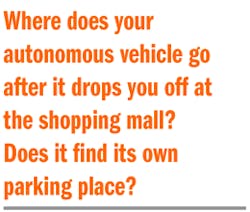I’m sorry, I just cannot get on board with this whole autonomous car movement. It just doesn’t make any sense to me. Why would you abdicate your driving rights to a machine? I realize that the technology is there to do this, and there is a massive effort inside and outside the automotive industry to produce self-driving cars. But why are we doing this?
Technology is definitely a key driver of this movement. We now have the sensors and processors, and the intelligent software is being developed. We can do this right now. It’s not perfect and never will be, but it is a very marketable (although expensive) technology. The whole movement is good for the electronics industry. The general public didn’t ask for this, but they are going to get it anyway.
Another driver is the government—specifically, the National Highway Transportation Safety Administration (NHTSA). It claims that self-driving cars will save lives. Over 30,000 die in cars each year in six million or so accidents, and more than 85% of those accidents and deaths are caused by human error, DUI, distraction, speeding or just recklessness.
I suspect some lives may be saved, but how many? This prediction is only a guess at this time. My opinion is that, yes, there will be some lives saved…and about as many new losses due to technological failures, driver misuse, or misunderstanding of self-driving limitations. It remains to be seen. At least the government has not yet imposed regulations while innovation and development continues.
I still have some questions about how all this will work. For example, where does your autonomous vehicle go after it drops you off at the shopping mall? Does it find its own parking place? How does it know to come get you when you are ready to leave?
What I don’t understand is why people want this. One survey indicates that 44% of car owners say that they would be likely or very likely to buy a fully autonomous car. I am amazed at this figure. I thought people liked their cars. I thought people liked to drive—or at least, don’t mind driving. I do enjoy driving. It is a real skill. Most of my family and friends love to drive. However, the type of vehicle does determine how much fun it is. Many cars are just flat boring.
Furthermore, cars reflect who we are. They show our personality or how we view ourselves. Corvette owners express themselves one way, pickup truck drivers another, and minivan moms another. Prius owners want to show others they are saving the earth, or maybe just coping with high gas prices.
What will a self-driving car owner say? I have no driving or navigating skills? I am lazy and would rather be texting or posting on Facebook? I realize there is a whole body of folks who hate their commutes and look upon their vehicle as just another appliance for transportation. So yes there is a niche for such vehicles. Incidentally, why aren’t those who hate driving taking public transportation where it is available?
By the way, I do love all of the new technological driver assists. My new Mazda CX-5 SUV has most of them, like backup camera, adaptive cruise control, automatic braking, lane departure warning, blind spot detection, and so on. (No automatic steering, though.)
All of this works well, but the caveat is that you need to learn about how this stuff works then get some experience in using it. It is a whole new driving experience. At some point when these systems are standard on vehicles, I suspect some new procedures will be needed with regard to education, testing, and licensing. And, oh yes—will self-driving car owners even need a license?
The success of autonomous cars has yet to be determined. There are a few now, like Tesla’s Autopilot Model S. Google is still testing its cars. Most traditional manufacturers are well on their way to having their own self-driving cars. Even non-auto companies may have them too, like Apple and Google. The target date seems to be 2020 and beyond for market-ready products.
In the meantime, the government still needs to figure out how to regulate these steering wheel-less road hazards, and insurance companies are trying to decide what to charge and who to sue or pay. Count me out, as I still like to drive. I just hope we will still have standard driver-dependent cars for throwbacks like me.
My prediction is that we will see this happen sooner than later. We will see self-driving taxis and 18-wheelers too. And all these vehicles will initially be expensive. I suspect that sales will be like those of electric cars. They will represent only a single digit percentage of all vehicles. They will not live up to the predictions of safety and convenience. Also your monthly insurance payment will be as much as your car payment. Or, I could be wrong.
How much do you trust technology? Are you ready to invest in a driverless car or share the road with others?
About the Author

Lou Frenzel Blog
Communications Technology
Click here to find more of Lou's articles on Electronic Design.



